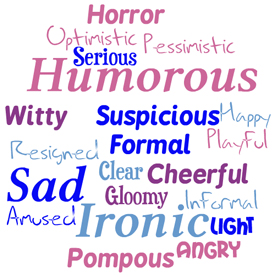Now that you are familiar with the definition of diction, you can probably pick out some of the descriptive words and phrases in a piece of writing. Since you also compared the dictionary meanings of words to their connotative or implied meanings, you know the difference between the literal, dictionary meaning (denotation) and the implied meaning (connotation) of a word. Now you are ready to analyze tone.
First, take a look at this list of words that might be used to describe the tone of a piece of writing. There are many, many more “tone” words; this list is just a sampling.

To see more words that could be used to describe tone, click on this link.
Remember, tone is the author’s attitude in a piece of writing— what an author wants you to “hear” as you read a piece of writing. If you’re having trouble recognizing tone, try reading the text aloud. You may be able to detect the author’s attitude toward the subject better.
Let’s take another look at the passages from the first exercise in this lesson. This time, read them and see if you can detect the tone of each. Think carefully about the words and phrases or diction that you highlighted in the first exercise. They have already been highlighted for you in this activity.
Let there be no illusions about the difficulty of forming this kind of a national community. It’s tough, difficult, not easy. But a spirit of harmony will survive in America only if each of us remembers that we share a common destiny; if each of us remembers, when self-interest and bitterness seem to prevail, that we share a common destiny.
- The tone in passage one is possibly—
It is not the critic who counts; not the man who points out how the strong man stumbles, or where the doer of deeds could have done them better. The credit belongs to the man who is actually in the arena, whose face is marred by dust and sweat and blood; who strives valiantly; who errs, who comes short again and again, because there is no effort without error and shortcoming; but who does actually strive to do the deeds; who knows great enthusiasms, the great devotions; who spends himself in a worthy cause; who at the best knows in the end the triumph of high achievement, and who at the worst, if he fails, at least fails while daring greatly, so that his place shall never be with those cold and timid souls who neither know victory nor defeat.
- The tone in passage two is possibly—
There he defeated the King of Armenia, and reduced Cappadocia to provincial status, but succumbed to a protracted illness at Antioch, being thirty-three years old when he died.
- The tone in passage three is possibly—
Our terribly wasteful use of electricity and non-renewable resources are likewise endangering our rivers, our oceans, and the atmosphere, which protects the planet.
- The tone in passage four is possibly—
Music at its best . . . is the grand archeology into and transfiguration of our guttural cry, the great human effort to grasp in time our deepest passions and yearnings as prisoners of time. Profound music leads us—beyond language—to the dark roots of our scream and the celestial heights of our silence.
- The tone in passage five is possibly—